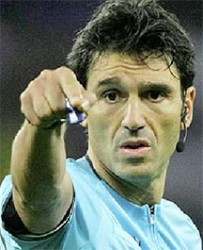ZURICH, (Reuters) – Detested in some countries and regarded as act of cunning in others, the practice of diving and feigning injury to win penalties and get opponents sent off has become ingrained in football almost everywhere.

Forwards have become increasingly adept at what is officially known as simulation, often provoking contact themselves yet somehow making it look the defender’s fault.
Referees have been caught in the middle and have to judge in a split second whether a foul was genuine or enacted, often an impossible decision to make even with the use of slow motion replays.
With the World Cup looming and the stakes higher than ever, soccer’s governing body FIFA is hoping that it can appeal to the conscience of the players to stamp out a practice which many feel is ruining the game.
“We need fair play,” FIFA’s head of refereeing Massimo Busacca told Reuters in an interview. “You cannot win the game with simulation, what are you to tell your children when you go home? “Will you say, ‘I won the game by simulation, it was cheating’? It should be an honour to win a game on merit.” Busacca’s comments may sound idealistic, especially in the pressure-cooker atmosphere of a World Cup, but he was hopeful that players would listen.
“I’m always positive,” said Busacca, a former Swiss and international refereee. “We stress that we want fair play, we want to see football, spectators want to enjoy football, so you have to win the game correctly. If we continue to say that, in my opinion we can achieve results.” In some cases, he said, players would even own up if a referee asked them what had happened.
“It happened to me twice in my career, in the first division. I asked the player if he was sure it was a foul and he said it wasn’t then I changed my mind…“It wasn’t in the penalty area but it was close. He said sorry and I changed my decision…imagine if we could have more of that in the future.” He added: “Of course, everyone wants to win, and such an important competition, sometimes the adrenalin and emotion are so much that you forget, sometimes you do not think, it’s like a habit.”
LESS VIOLENCE
On a positive note, Busacca said he believed that dangerously violent tackles had largely been eradicated from the game.
“I think that because we have worked a lot on prevention, we don’t see the really bad fouls any more,” he said. “I think the safety of the opponent is clear for the referee today. In my opinion we have reduced these bad tackles.”